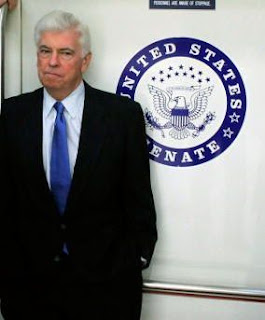 Until recently, I've been aware of Sen. Chris Dodd (D-Conn.) mainly because of his presidential campaigns. Dodd is one of those senators who runs for president periodically largely on the grounds that they have been in the Senate forever, and thus, have nothing left to accomplish to round out their resumes except becoming president. Hence the moral clarity and inspirational tone of 2007's famous "Why not Dodd?" slogan. (If I ever run for president, it'll be under the slogan "Might as well vote for Ringguax.")
Until recently, I've been aware of Sen. Chris Dodd (D-Conn.) mainly because of his presidential campaigns. Dodd is one of those senators who runs for president periodically largely on the grounds that they have been in the Senate forever, and thus, have nothing left to accomplish to round out their resumes except becoming president. Hence the moral clarity and inspirational tone of 2007's famous "Why not Dodd?" slogan. (If I ever run for president, it'll be under the slogan "Might as well vote for Ringguax.")Most recently, I was excited by the possibility that Dodd might get defeated in his reelection campaign by WWE CEO Linda McMahon, but Dodd forestalled that by announcing his retirement. Bummer. (Though at least we got to see the power of McMahon's opposition research unleashed on Richard Blumenthal.)
But before he sails off in to the sunset, Dodd has one more trick up his sleeve: the Restoring American Financial Stability Act of 2010, now on the verge of becoming law. Here are my thoughts on the law:
The Dodd Bill purports to be a response to the financial meltdown of 2008. Now, in my humble opinion, the biggest cause of the 2008 financial crisis was the overleveraging of capital throughout the financial services sector. Firms should never have been allowed to leverage assets on a 30:1 or even 40:1 basis. Basically, there was excess debt in the American financial sector. (Now, unfortunately, rather than pursue a strategy of deleveraging the American economy, the Obama administration has simply chosen to replace irresponsible levels of private debt with equally irresponsible levels of public debt, but that's a topic for another post.) So, I do think there needs to be regulation, but I don't think that regulation needs to be anything more complex than imposing tighter capital requirements on the banking sector to prevent excess leverage.
So, what does the Dodd Bill actually do? With a nod to the Federalist Society, the bill has eight major features:
(1) Creation of a Consumer Financial Protection Bureau.
(2) Creates a Financial Stability Oversight Council.
(3) Expands the Fed's ability to regulate large banks and financial service organizations.
(4) Regulates derivatives.
(5) Expands the ability of the SEC to regulate hedge funds and the credit rating agencies.
(6) Minor Executive Compensation reform.
(7) Gives the Fed new power to monitor "systemic risk".
(8) Creates an Office of National Insurance.
I will comment on these features of the bill in follow-up posts.
No comments:
Post a Comment